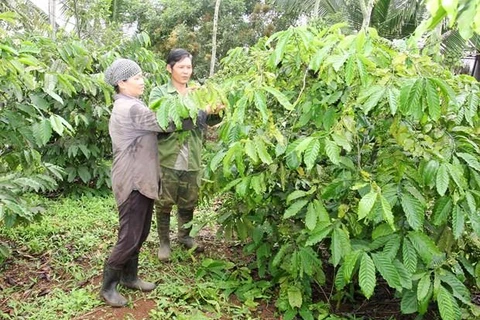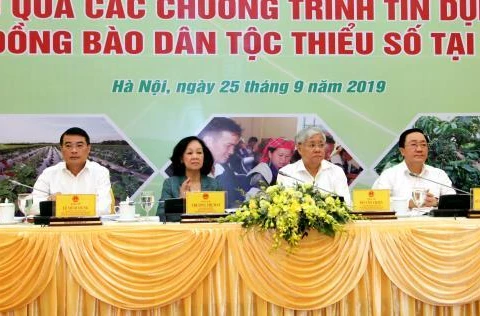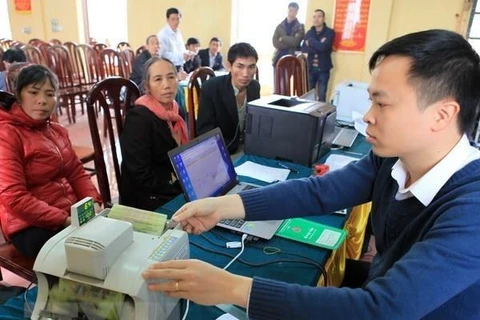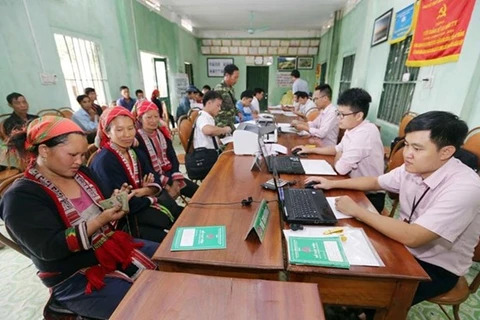Dak Lak (VNA) - The policy credit fund has for many years become the main direct support tool for the Central Highland province of Dak Lak to implement the national target programmes on sustainable poverty reduction and new-style rural area building.
 VBSP General Director Duong Quyet Thang works with representatives of Ea Bar commune's mass organisations (Photo: VietnamPlus)
VBSP General Director Duong Quyet Thang works with representatives of Ea Bar commune's mass organisations (Photo: VietnamPlus) Located in the center of the Central Highlands, with the advantage of developing industrial crops, Dak Lak has boasted many commodity brands such as pepper and cocoa. But it is not easy for sustainable poverty reduction and development in a community of up to 47 ethnic minority groups like Ede, M'Nong, Thai, Tay and Nung, who account for nearly 30 percent of the local population.
Joining hands to reduce poverty
A working delegation of the Central Steering Committee for National Target Programmes led by General Director of the Vietnam Bank for Social Policies (VBSP) Duong Quyet Thang visited Ea Bar commune, Buon Don district. This place is no longer the land where coal burning developed in previous years. Now it is home to many new industries transformed by local people with the support of social policy capital.
Other economic development paths have also been opened with the VBSP’s policy of ensuring all eligible poor and policy beneficiaries gain access to loans.
Chairman of the communal People's Committee Y Sen Kbuo said the commune has 3,669 households and 17,718 people, with 36 percent being ethnic minorities living mainly on agriculture and animal husbandry. Therefore, the locality has encouraged people of all classes to engage in the implementation of the new-style rural area building programme in association with raising the quality of the movements of associations and unions such as "All people unite to build new-style rural and civilized urban area", "Farmers strives for good production and business", " Buon Don youths join hands to build new-style rural areas”, among others.
There are 726 poor households, accounting for 20.52 percent, and nearly 486 near-poor households, or 13.74 percent. In the period of 2016-2020, the VBSP’s Buon Don branch has coordinated with the Party committees and authorities of communes as well as socio-political organizations entrusted to give loans in promoting policy credit activities, creating favourable conditions for poor households and other policy beneficiaries to have capital to invest in production and animal husbandry in order to improve their lives and escape poverty sustainably.
In the first six months of 2019, total credit in the commune reached nearly 12 billion VND, with 391 households getting loans. As of June 30, 2019, outstanding loans were worth nearly VND 52 billion, with 1,864 families.
Recognizing the efforts of this locality, VBSP General Director Duong Quyet Thang asked the authorities at all levels and mass organizations to implement programmes and projects synchronously so that people can have access to policies such as preferential loans, policy credit, labour export and vocational training, job generation, health care and education.
Ensuring all eligible households have access to loans
For Dak Lak province, the scientific implementation of the two national target programmes for the 2016-2020 period with the support of social policy credit has contributed to sustainable poverty reduction in the locality.
In recent years, despite the limited budget, the province has prioritized the allocation of trust funds to the Vietnam Bank for Social Policies, with the total balance reaching more than 220 billion VND so far, an increase of over 25 billion VND from 2018, ranking first among provinces in the Central Highlands and 13th in the country in terms of local trust funds. All 15 districts, towns and cities in the province have paid attention to allocating budget capital for social policy credit.
In 2018 and the first eight months of this year, the VBSP’s provincial branch has provided loans worth 2.7 trillion VND for more than 94,000 poor households and policy beneficiaries under credit programmes. As of August 31, the total outstanding loans of policy credit programmes in the province reached over 4.7 trillion VND, an increase of 8.1 percent against 2018.
During the period, policy credit contributed to supporting production and business activities and creating jobs for more than 3,700 labourers. It has helped 76 workers to work abroad under fixed-term contracts and nearly 1,200 disadvantaged students to borrow loans to serve their study. Nearly 40,000 clean water and sanitation works in rural areas have been built, along with more than 3,000 houses for poor households, contributing to giving a facelift to local rural areas.
By the end of 2018, 43 out of 152 communes in the province met the new-style rural area criteria. The figure is expected to rise to 50 this year, accounting for 32.9 percent and fulfilling the assigned plan./.

























